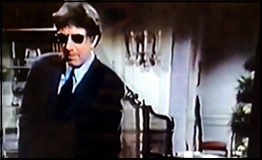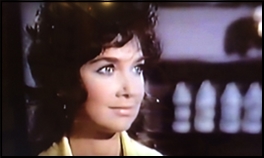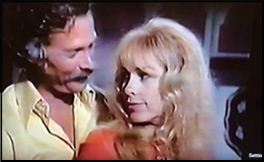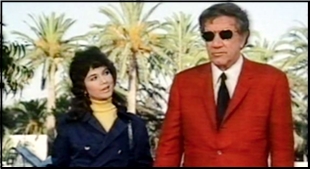Tue 13 Oct 2020
A Made-for-TV Movie Review by Mike Tooney: IN BROAD DAYLIGHT (1971).
Posted by Steve under Reviews , TV mysteries[8] Comments
IN BROAD DAYLIGHT. Made for TV movie. ABC, October 16, 1971. Running time: 74 minutes. Richard Boone (Tony Chappel), Suzanne Pleshette (Kate Todd), Stella Stevens (Elizabeth Chappel), John Marley (Lt. Bergman), Fred Beir (Alex Crawford), Whit Bissell (Capt. Moss), Paul Smith (Charlie). Producers: Robert Mirisch and Aaron Spelling. Writer: Larry Cohen. Director: Robert Day.

It’s graduation day for retired actor Tony Chappel as he signs an autograph and leaves the rehab center. Kate Todd has been assigned as his personal assistant and sees nothing sinister in Tony’s vigorous efforts to reacclimate himself to a more or less normal life, as Tony insists on taking cabs and buses all around town from his beachfront home until he knows the routes by heart.
Certainly his faithless wife Elizabeth isn’t alarmed, but there’s good reason why she should be: Tony plans to kill her and her lover at the earliest opportunity. Only three things stand in Tony’s way: a common object found in most American households, a smart police detective, and probably the biggest obstacle between Tony and his goal, a fact which we’ve known since the first scene, that he is totally and irremediably blind . . . .

In a Wikipedia article about In Broad Daylight we learn that writer Larry Cohen thought Richard Boone was miscast, but we couldn’t disagree more. Boone is excellent, watchable in every scene, and interest never flags as the story unfolds, which, considering too many made for TV films, is saying something.
Richard Boone is remembered primarily for his TV series, Have Gun – Will Travel (1957-63; 225 episodes), but if the script called for it he could be the meanest sonuvagun around (e.g., the John Wayne opus Big Jake, 1971).

The supporting cast is filled with faces you might know but couldn’t put a name to. You probably remember Suzanne Pleshette and Stella Stevens, of course (who wouldn’t?), but there are great character actors here as well: John Marley (e.g., Cat Ballou, 1965), Fred Beir (well over a hundred guest shots, mostly in television), Whit Bissell (over three hundred appearances!), and, next to Bissell, possibly the most familiar face, Paul Smith, who specialized in memorable bit parts everywhere but did have steady work in The Doris Day Show (1969-71; 33 episodes) and a completely forgotten superhero sendup series, Mr. Terrific (1966-67; 17 episodes), as well as No Time for Sergeants (1964-65; 13 eps), The Gertrude Berg Show (1961-62; 18 shows), and Fibber McGee and Molly (1959; 4 episodes).
Veteran television director Robert Day would go on to work on one of our favorite Levinson & Link efforts, Murder by Natural Causes (1979), which we hope to get to soon.
Despite the writer’s misgivings, we unhesitatingly recommend In Broad Daylight. It’s a worthy installment in “The Perfect Murder” subgenre.

October 14th, 2020 at 8:32 am
It pushed the limits of credibility and then some, , but an intelligent script and that excellent cast saved it for me.
October 14th, 2020 at 9:14 am
If you go searching for the movie on YouTube, beware that there is a second movie with the same title starring Brian Dennehy that it’s easily confused with. For this one starring Richard Boone, I’ve found short clips and the version below, but with Swedish or Danish subtitles, nor is the picture quality all that good. I am fairly sure it’s available on DVD.
October 14th, 2020 at 6:25 pm
Boone almost never got a chance to stretch, being typecast in certain roles. I remember the short lived anthology series he did where he got to play many different roles.
This is indeed a solid made for Television movie with an outstanding cast of familiar and talented faces.
October 14th, 2020 at 7:47 pm
Director Robert Day and his TV movies were praised in the 1970’s by the great Andrew Sarris, no less.
But I’ve never managed to see most of them.
Did see “Twin Detectives” (1976), which is pleasant and nice, but not brilliant. This is the only Day seen here.
Have to get caught up on the rest of these!
October 14th, 2020 at 8:11 pm
It really is hit or miss whether or not you can find a copy of an old made-for-TV movie to watch. Mostly, I suspect, there’s not enough demand for an official release to be worth doing.
October 14th, 2020 at 8:52 pm
I take it that Mr. Grost hasn’t yet gotten to House On Greenapple Road, mentioned elsewhere on this site.
Robert Day did that one as well, a couple of years before this one.
Of course I always envied Robert Day, because he got to marry Dorothy Provine IRL – but that’s another story …
October 14th, 2020 at 9:57 pm
And here’s the link to that old GREENAPPLE review:
https://mysteryfile.com/blog/?p=59037
October 28th, 2020 at 8:51 pm
[…] As you might recall, Robert Day, the director, also helmed In Broad Daylight (1971), featured recently on Mystery*File here. […]